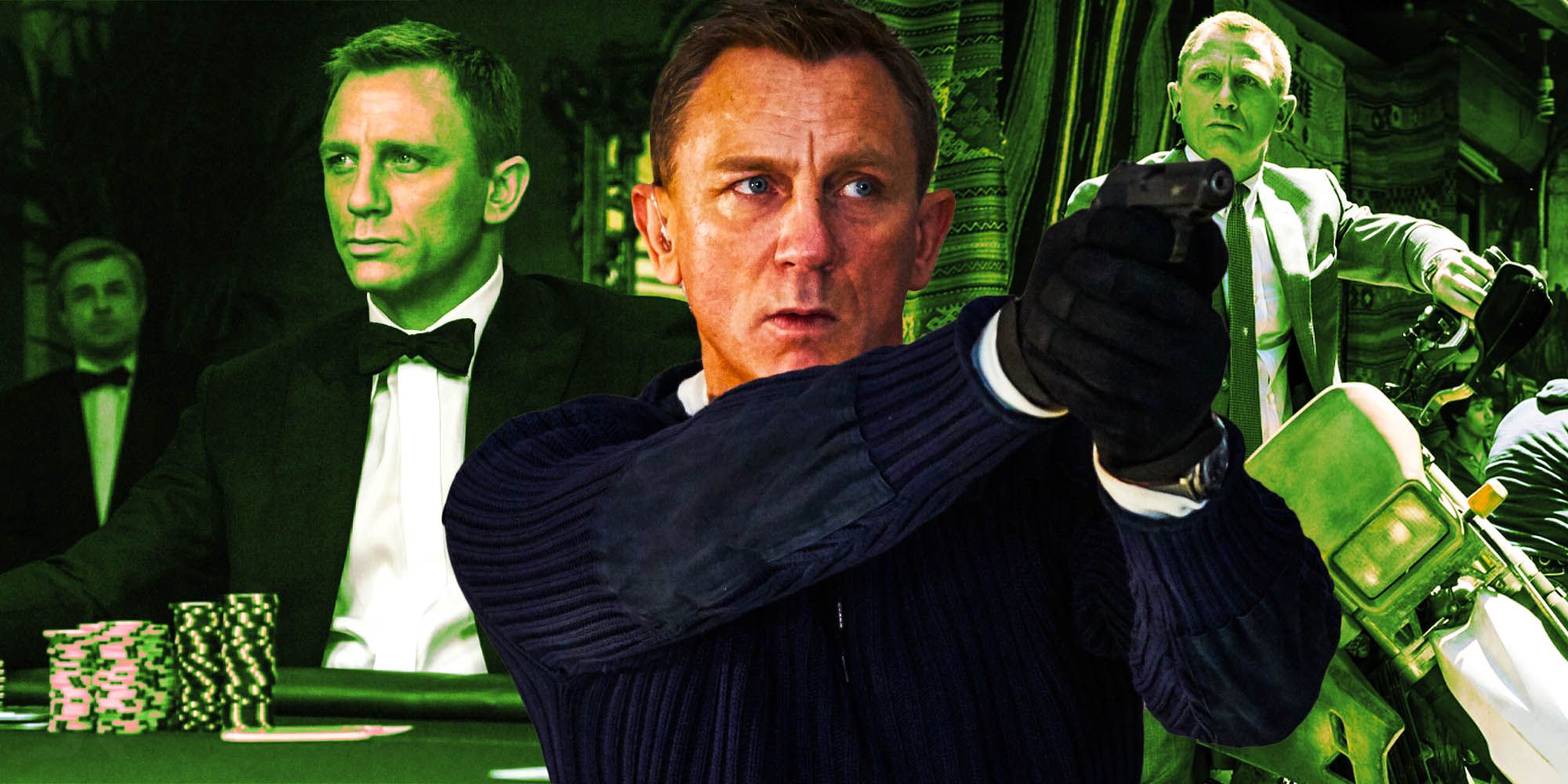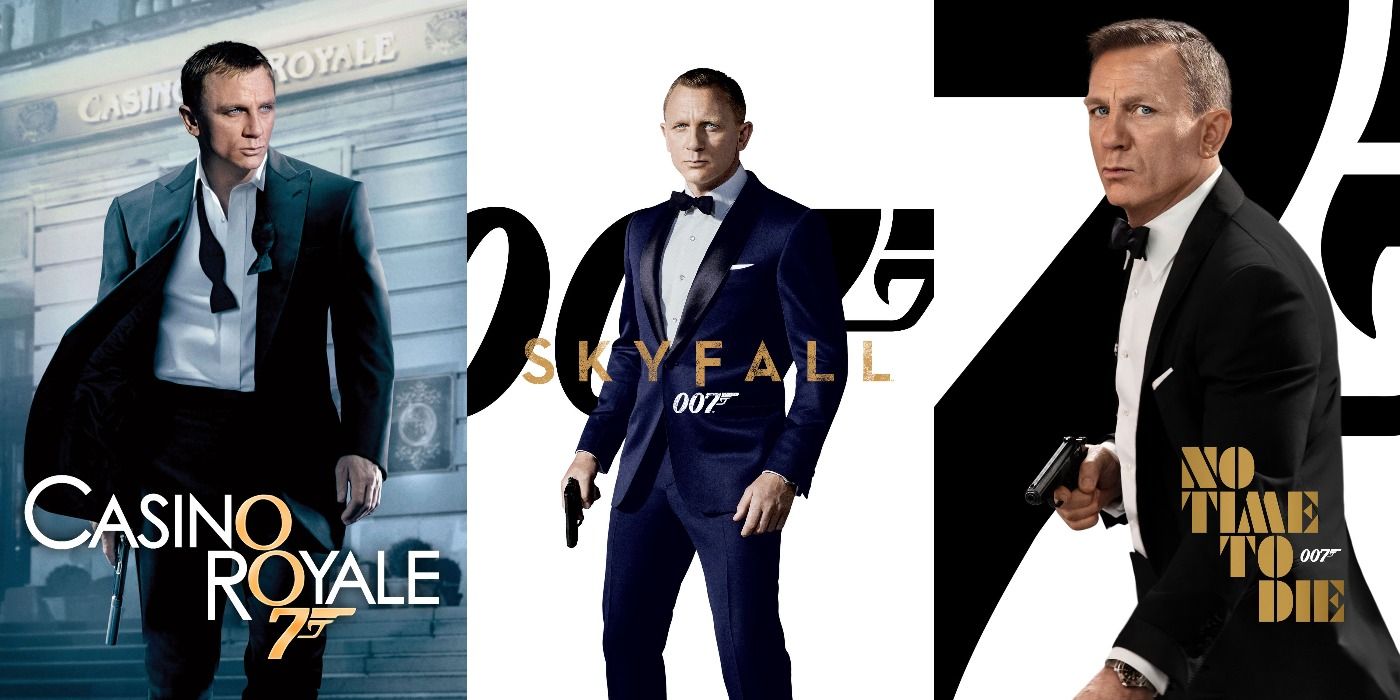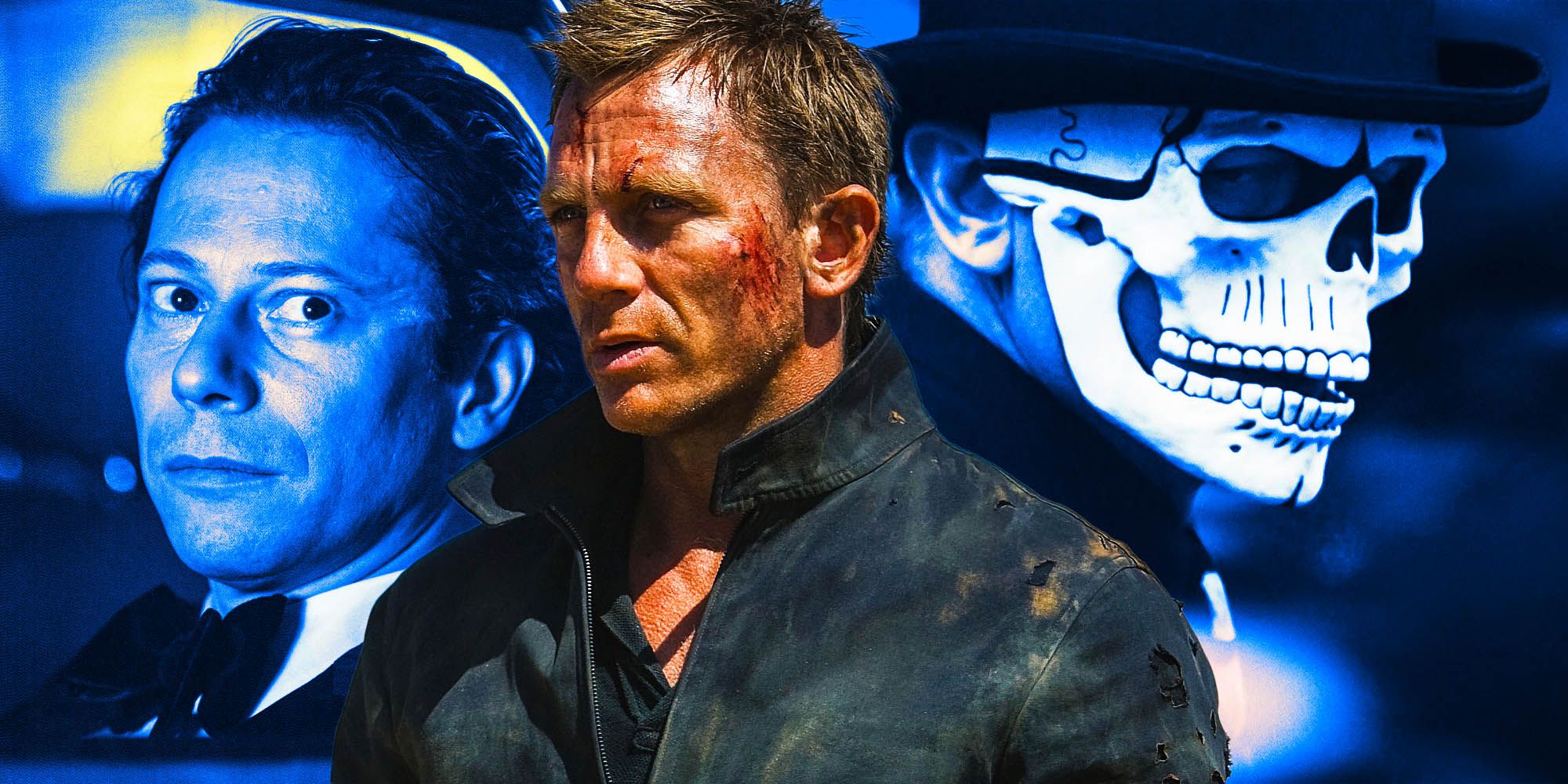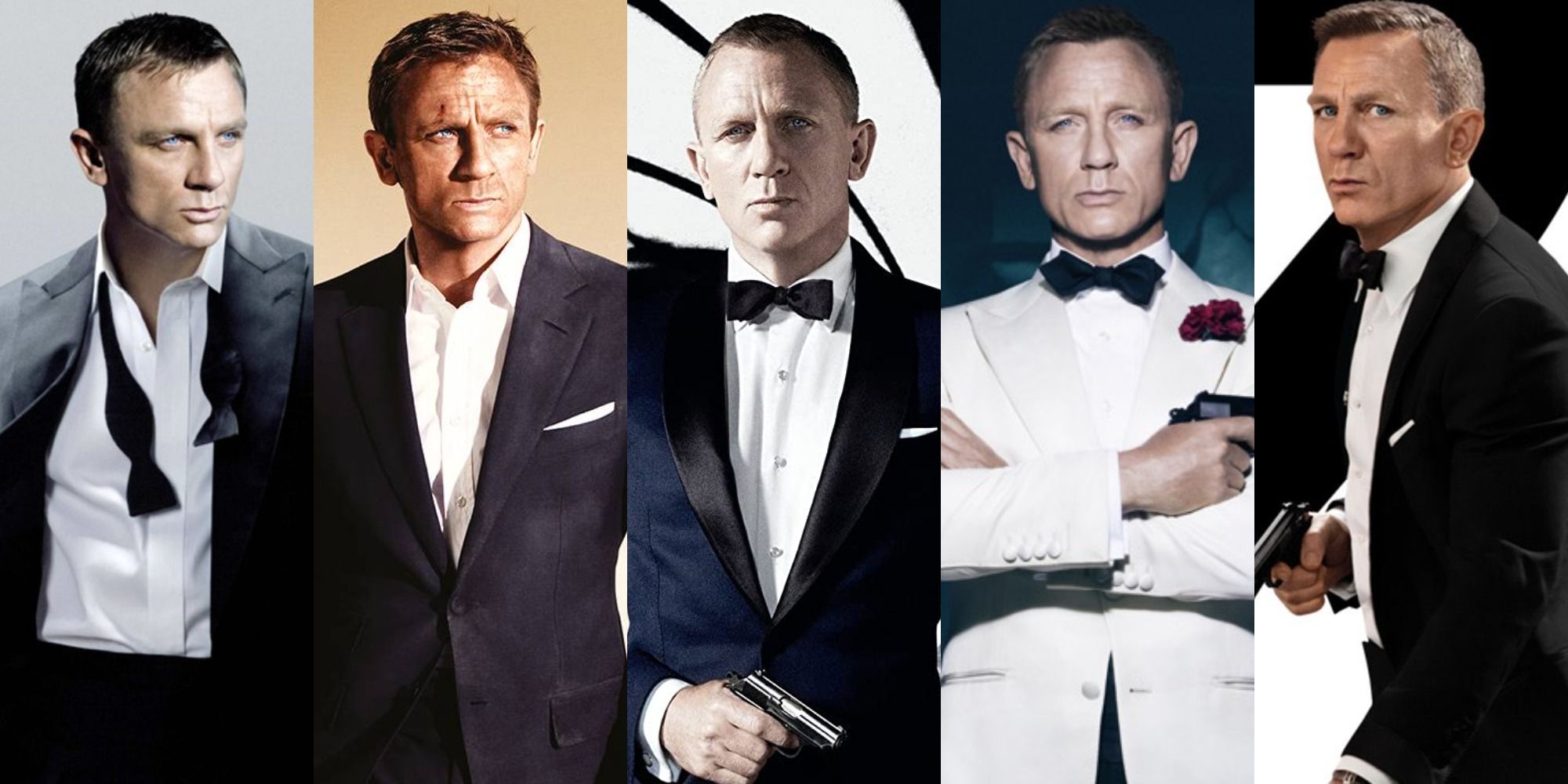Warning: Major spoilers ahead for No Time To Die
No Time To Die ends Daniel Craig's time as James Bond, and with Casino Royale and Skyfall concludes a perfect Bond trilogy, albeit with two additional (and largely superfluous) films. Daniel Craig's time as James Bond started in 2006, taking over from Pierce Brosnan after Die Another Day. Casino Royale rejected the CGI and far-fetched gadgetry that the series had come to rely on, and took on a more grounded and realistic approach to espionage, as championed by the Bourne films. This set the tone for a Bond era that stands alone from previous incarnations of the character.
After Casino Royale, a direct sequel was rushed into production and 2008's Quantum of Solace took the idea of Bond being gritty and humorless and pushed it to 11. The results were less-than-stellar, and Sam Mendes was brought in to get back to classic James Bond territory. He delivered with 2012's Skyfall, offering everything Bond fans wanted from a 007 movie, while also providing an emotional and fresh story. Mendes returned in 2015 for Spectre, reintroducing audiences to the character of Ernst Stavro Blofeld. Fan's hopes for a repeat of Skyfall's quality however were disappointed. With Daniel Craig wanting to leave James Bond on a high note, he came back to the role a fifth and final time for No Time To Die. The film received positive reviews and provides a fitting conclusion for his version of the character.
Human beings are known to respond to patterns of three, and the foundation of storytelling can be summed up as three parts: a beginning, a middle, and an end. Act 1 is the setup, establishing the world and characters in it, as well as their goals. Act 2 is known as the confrontation, where the stakes are raised and the characters face setbacks in achieving their goals. The final act (the resolution) ties together narrative threads and brings everything to a close. While the James Bond franchise has 25 official entries, Daniel Craig’s run has been the first time that the creatives have sought to tell an ongoing story across multiple films. Although the five-film arc as a whole fluctuates thanks to questionable entries like Spectre and Quantum of Solace, Craig's other three Bond films actually fit this structure perfectly. Here's why, taken in isolation, Craig inadvertently made a perfect Bond trilogy.
Casino Royale, Skyfall & No Time To Die Are A Perfect Bond Trilogy
Daniel Craig's James Bond journey has the three-act structure of one story told over three movies: Casino Royale, Skyfall, and now No Time To Die. Casino Royale sets up his character at the start of his career as a double-0. He's a blunt instrument with an ego, who will risk it all no matter how high the stakes are. Falling in love with Vesper strips him of his armor. Their love story offers some of the most emotional scenes in a James Bond film. Her subsequent betrayal then turns Bond's heart to stone, despite the grief of losing her. He's learned his lesson not to trust anyone. It's a good lesson for a spy who will do anything for the mission, but less so for a human being.
Skyfall takes a now seasoned Bond and raises the stakes. Villain Silva's quest to destroy M (Judi Dench) centers on her past and what she's left behind. In protecting her Bond is forced to look back at his own roots. He gives everything he's got to protect the closest person he has to a mother, and it's not enough.
No Time to Die takes the themes of love, trust, loss, and legacy that run through Casino Royale and Skyfall, and brings them to a head. As No Time To Die's opening credits roll, Bond has turned his back on the chance of happiness with Madeleine, wrongfully thinking she betrayed him just as Vesper did. As they reconnect years later he then opens up to loving and trusting again. In the end, he's willing to give his own life, not for Queen and country, but for the people he loves. James Bond, who couldn't save Vesper, who couldn't save M, can save Madeleine and their daughter Mathilde, giving them all the time in the world. With his death, his journey is complete, but his legacy lives on in his love for them, and the time he's given them through his sacrifice. It's the perfect journey for a character who historically wiped the slate clean with each new adventure.
Quantum Of Solace and Spectre Hurt Daniel Craig's Bond Era
Though the Daniel Craig era has its perfect three-act structure, his two other Bond films dilute the quality of the storytelling somewhat. Quantum of Solace's script and production process was hurt by the 2007-2008 writer's strike, with scenes being reworked on the day. Even though it had an immense budget of $230 million, it's hard to fathom where that money went, as little of it is present on the screen, and the film comes in at a lean 106 minutes. While the action is decent in its construction, the frenetic editing style that was in vogue at the time renders most of them unwatchable.
Quantum of Solace's shortfalls, when viewed as part of a 5 film arc, are compounded by the fourth installment, Spectre. The re-introduction of Blofeld and Spectre hurt Daniel Craig's big James Bond story. All the setup of Quantum as the big, bad, and unstoppable criminal organization was quickly forgotten, becoming simply a subsidiary of Spectre. Characters and story threads that were set up in Quantum of Solace are dropped, leaving the film as a narrative cul-de-sac.
After the success of Skyfall, Spectre had largely the same creative team, however, lightning did not strike twice. Spectre hits all the prerequisites for a 007 movie, but it fails to come together as a cohesive whole. The action is by the numbers and unspectacular (the Mission Impossible films have long usurped 007 in the action arena) and the plot is pedestrian. However, crucially the decision to retcon Blofeld and Bond growing up as brothers is its ultimate undoing. It's a ridiculous concept and trying to squeeze in Bond's arch-nemesis as being behind all of his misfortunes and the actions of the villains in the previous films lessen's their impact, especially when they're supposedly fueled by sibling jealousy.
Craig's 5 Bond Movies Still Make A Great Arc
Notwithstanding that Casino Royale, Skyfall, and No Time To Die make a perfect James Bond trilogy, that doesn't mean that Quantum Of Solace and Spectre are entirely without merit. Even the weakest Bond films have something to offer, and every Bond film will be someone's favorite. Quantum of Solace has a fantastic David Arnold score and Daniel Craig is still great as James Bond in it. Quantum of Solace's problems are also less critical if it's thought of more as a fourth act or appendix to retcon Casino Royale, as opposed to a separate adventure. While that logic cannot be applied to Spectre, it still has a visually spectacular opening made to appear as a single shot, and Hoyte van Hoytema's cinematography is sumptuous. Individual scenes when taken on their own work well, and still add to James Bond's overall journey as a character.
Daniel Craig's version of James Bond changed the character forever. Whereas once upon a time there was validity in saying that James Bond was one-dimensional and/or a caricature of himself, Daniel Craig's arc made him human. His James Bond had emotions, he hurt, he grew, he evolved. Time and death took their toll on him. Loved ones changed him. Through all 5 films, James Bond lived a life that had meaning and purpose, and as a result, he's left an enduring legacy both onscreen and off.




